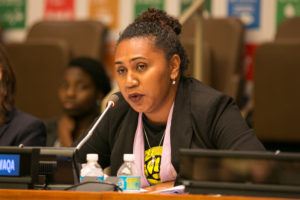
This article was published in the issue of November 2017 of the newsletter DAWN Informs.
Viva Tatawaqa is member of Diverse Voices and Action for Equality (DIVA) in Fiji, a member of RESURJ, and an alumna of DAWN’s 5th DTI[i] held in Sri Lanka 2016. She is a young Pacific feminist grassroots community facilitator and mobilizer and works at local, national, regional and global levels on issues of universal human rights and social, economic, ecological and climate justice.
At this year’s High-Level Political Forum on Sustainable Development (HLPF), Viva was invited to make the Opening Statement on behalf of the Women’s Major Group, which represent many feminist and women-led organizations, networks and coalitions. Viva’s statement carried many important messages about global injustices and barriers to addressing these[ii]. She called for real solutions that are political and available to us all. She emphasised the role of HLPF as a space where political will is needed to make genuine and effective decisions.
This interview captures some of her reflections on HLPF 2017 as a Fijian feminist, reiterating some of her key messages and her views on sites of influence and advocacy for young women feminists.
What are some highlights and learning from your HLPF experience?
The biggest highlight was the opportunity to deliver the CSOs’ statement at the High Level Political Forum 2017. I thank those who pushed for my participation. I consider this as another step forward in my advocacy work at a very personal level. Even though I was nervous as hell, I pushed myself to use this platform to represent the women that I have advocated with and for on different issues. We all have experienced how hard it is to have our voices heard at such a high level meeting. Another highlight was the accompaniment and support from women’s organisations and networks from different parts of the world and being part of the Women’s Major Group, working together to put this statement together – starting here at home in Fiji then off to the broader group. The fact that many felt the statement was inclusive of what they were fighting for back in their countries and they had been heard was a highlight in itself. Some lessons learnt in understanding how important processes are when collating such a statement was also a highlight. People worked hard to ensure the right text was used and the flow of the statement was clear. I thank all those who worked tirelessly to make it a strong statement.
How do spaces like HLPF help Southern feminists like yourself with advocacy?
VIVA: I know that CSO’s are going through tough times right now with the shrinking of spaces. The strategic thing to do right now for me, as a Pacific women, is to keep engaging in this kind of space. As long as we can still access such spaces there is a chance we can make change. As South feminists organising, engaging in this kind of spaces can be very challenging for we always have to fight our battles twice as hard to ensure we don’t get caught up under the same voice or strategies as the Northern countries as we do not share the same contexts and realities. Speaking about intersectionality and differences will help us move forward towards how we can work better together as North and South feminists without harming each other and how we as the feminist movement can demonstrate that better in these kinds of high level meetings. It helps by creating spaces where we can directly share the work, challenges and achievements of the work we doing on the ground and regionally and globally and this also can be a space where we build relationships and allies. Ensuring not too only speak as an individual voice but as an activist that represents a constituency community and movement will then add value to your advocacy work.
As a Pacific Woman, you made mention the urgency of Ocean justice in your HLPF statement. What are some key messages on Ocean Justice for your feminist sisters?
As someone that lives on an island, which is actually surrounded by Oceans, which is at a high risk of losing everything it is important to raise the IMPORTANCE OF TAKING ACTIONS NOW ON CLIMATE JUSTICE. The urgency of taking action needs to be raised more and more in all spaces we want to talk about simple human rights issues because Climate Justice is about the right to healthy and stable livelihoods. Let’s keep raising our voices louder and support the work that most organisations, communities and networks are already doing to demand urgent action now to save and protect our marine environment.
[i] DAWN Training Institutes (DTIs) have been organized since 2003 as a space to share DAWN’s accumulated knowledge, analyzed, debates and experiences. During the DTIs younger feminists from the South are exposed to theory, discussions and inter-active processes related to feminism, feminist movements, women’s rights, and local and global strategies to achieve social justice.
[ii] To read Viva’s statement go to: http://www.womenmajorgroup.org/wp-content/uploads/2017/07/VivaT_Opening_Session_Intervention_HLPF2017FINAL.pdf
